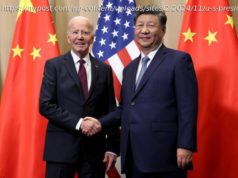Republicans need to do a lot more than say the right words about Nazis to atone for their role in the revival of the racist right.
On Saturday, white supremacists marched on Charlottesville to defend the honor of men who fought for their right to keep dark-skinned people as chattel. That same day, in the same city, socialists, anarchists, and Nazi-hating normies marched to defend the fundamental dignity of all human beings. One member of the first group sped his car through the latter one, killing a 32-year-old woman and injuring 19 others.
Hours later, the president of the United States condemned “the hatred, bigotry, and violence — on many sides .”
Donald Trump went on to say that Americans must “cherish our history, ” a phrase that, in context, could be understood only as an expression of support for the preservation of Confederate monuments — which is to say, for the cause that had brought Nazis and blood to the streets of Charlottesville. Trump then congratulated himself for bringing new jobs to the United States and touted his plans for veterans’ health care. He did not utter a single unkind word about the “alt-right” or neo-Nazis. As he walked away from the podium, a reporter asked if he welcomed the support of white nationalists. The president kept walking.
To their credit, a number of prominent Republicans rushed to answer the reporter’s question in the negative. Senators Chuck Grassley and Jeff Flake decried the evil of white supremacy. Orrin Hatch said his brother “didn’ t die fighting Hitler for Nazi ideas to go unchallenged here at home.” Ted Cruz declared that every American has a moral obligation to speak out against “the lies and bigotry” of the KKK, and called on the Justice Department to investigate Saturday’s act of “domestic terror.” Marco Rubio subtly criticized the president for failing to address the evildoers by name.
That such statements were the bare minimum dictated by decency does not make them any less important. These days, we can’ t take decency for granted. On Saturday, America needed its elected officials to know an act of racist terrorism when they saw it. Many GOP leaders did.
For the Republican Party to truly distance itself from the cause of white supremacy, however, it is going to have to do a lot more than that. Trump’s failure to describe the “ events in Charlottesville for what they were ” was a moral abomination. But so is congressional Republicans’ daily failure to describe Trump for who he is — or the party of Lincoln, for what it has become.
For half-a-century, the GOP has deliberately exploited — and inflamed — white racial animus, as a means of obtaining political power. That isn’ t partisan hyperbole; it’s historical fact. In 1964, The Democratic Party’s embrace of civil rights left most of the white South (and hefty portions of the white North) without a political home. This development provided Republicans with a great opportunity, so long as they were sufficiently cynical — or reactionary — to exploit it.
Richard Nixon was both. “We’ ll go after the racists, ” Nixon’s special counsel John Ehrlichman wrote, summarizing the spirit of his boss’s 1968 campaign. “The subliminal appeal to the anti-black voter was always present in Nixon’s statements and speeches.”
After the election, Nixon’s chief-of-staff H. R. Haldeman wrote in his diary that president had told him, “you have to face the fact that the whole problem is really the blacks. The key is to devise a system that recognized this while not appearing to.” The system they settled on became known as the Southern Strategy. Its core premise was that the GOP had everything to gain from polarizing the electorate along racial lines, and that this could be done through the deployment of coded appeals to white racists — “dogwhistles” that right-thinking fiscal conservatives could effortlessly ignore.
Republican consultants made no secret of this strategy. Some wrote best-selling books about it.
Over the ensuing decades, the gambit was updated but never abandoned. As the legendary GOP strategist Lee Atwater infamously observed:
In 1980, Ronald Reagan launched his presidential campaign by extolling the virtues of “states’ rights” in Neshoba County, Mississippi — a place where that phrase was synonymous with the defense of white supremacy, and where the defenders of white supremacy had infamously lynched three civil rights activists. In 1988, George H. W. Bush’s campaign worked tirelessly to portray Michael Dukakis as soft on black criminality — or, as Bush’s campaign manager, Lee Atwater, put it, to “make Willie Horton his running mate.” Twelve years later, Bush’s son would secure the GOP nomination with the help of a whisper campaign that painted his chief Republican rival as the father of an African-American child .
Barack Obama’s election did not deliver us into a “post-racial” society. If anything, it did the very opposite. The reality of a dark-skinned president threatened a vital source of many a white American’s fragile sense of self-respect. And just as the backlash to civil rights had done decades earlier, the ensuing explosion of white racial animus provided the right with a fulsome opportunity. Fox News seized it with both hands — and, thus, so did Donald Trump.
Establishment Republicans may have had little taste for “birtherism”— but they took great pains to ensure that birthers felt welcome in the GOP tent. In 2012, Mitt Romney flew to Las Vegas to accept the “honor” of Trump’s endorsement.
Marco Rubio has, on occasion, sought to distance himself from Trump, and the racist paranoia that the mogul stands for. But when the Florida senator was trying to salvage his presidential bid in New Hampshire last year, he endorsed the core premise of birtherism — that Barack Obama isn’ t a real American, but rather, a covert enemy of all that real Americans hold dear — over, and over again:
Marco Rubio knew exactly what he was doing.
Meanwhile, Ted Cruz felt no moral obligation to condemn bigotry during the 2016 campaign, but saw great political expedience in praising Trump’s “bold” insights on the threat of illegal immigration, and, later, in calling for law enforcement to “ patrol and secure Muslim neighborhoods .”
Like the vast majority of their colleagues, both men went on to endorse the presidential campaign of a man who had repeteadly refused to condemn the KKK; encouraged political violence against his African-American protestors; and praised the mass-murder of Muslim prisoners of war with bullets dripped in pig’s blood.
If Rubio and Cruz genuinely wish to combat the political mobilization of racists, they might start by renouncing the role that they — and their co-partisans — have played in encouraging it.
Doing this would require them to disavow much more than rhetoric. It would be comforting to think that the GOP was pulling one over on bigots — flattering their prejudices to get elected, then ignoring their wishes when sitting down to make policy. But in many cases, the opposite is true: There are plenty of Republican lawmakers who campaign with utmost civility, and then push legislation that objectively advances racial inequity.
In states all across the country, Republicans have made suppressing the political participation of nonwhite voters a top legislative priority. Granted, GOP lawmakers only cop to this fact every once in a while. But the scrim of “ election integrity ” is a thin one, as federal courts keep finding.
There is no evidence that American elections are plagued by voter fraud, despite the second Bush administration’s strenuous efforts to generate some. But there is copious evidence that the Republican Party’s preferred means of combating voter fraud just so happen to make voting more difficult for nonwhite people.
In the allocation of electoral resources, GOP state governments don’ t even bother with pretenses: After Obama won Indiana in 2008, state and local Republicans “expanded early voting in GOP-dominated areas and restricted it in Democratic areas, ” thereby producing “a significant change in Central Indiana voting patterns, ” the Indianapolis Star reported last week.






